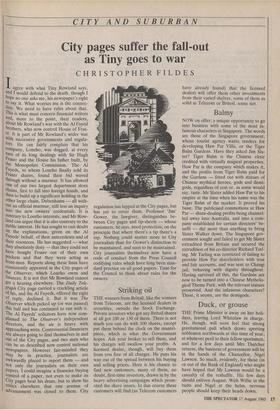CITY AND SUBURBAN
City pages suffer the fall-out as Tiny goes to war
CHRISTOPHER FILDES
Iagree with what. Tiny Rowland says, and I would defend to the death, though I hope no one asks me, his newspaper's right to say it. What worries me is the connec- tion. We need to have rules about that. This is what must concern financial writers and, more to the point, their readers, about Mr Rowland's war with the Al Fayed brothers, who now control House of Fras- er. It is part of Mr Rowland's wider war with successive governments and regula- tors. He can fairly complain that his company, Lonrho, was dogged, at every turn of its long dealings with Sir Hugh Fraser and the House his father built, by the Monopolies Commission. The Al Fayeds, to whom Lonrho finally sold its Fraser shares, found their bid waved through without a murmur. It has allowed one of our two largest department store chains, first to fall into foreign hands, and then to build up a significant holding in the other large chain, Debenhams — all with- out an official murmur, still less an inquiry into the new owners' credentials. It is contrary to Lonrho interests, and Mr Row- land can argue that it is also contrary to the Public interest. He has sought to cast doubt on the explanations, given on the Al Fayeds' behalf, of their antecedents and of their resources, He has suggested — what they absolutely deny — that they could not have bought Fraser out of their own pockets and that they were acting as front-men. Reports along these lines have consistently appeared in the City pages of the Observer, which Lonrho owns and finances. It is not that Mr Rowland cannot get a hearing elsewhere. The Daily Tele- graph City page carried a crackling article of his, and the Al Fayeds, offered the right of reply, declined it. But it was The Observer which picked up (or was passed) this ball and has continued to run with it. The Al Fayeds' solicitors have now com- plained to The Observer's independent directors, and the air is heavy with approaching writs. Controversial financiers are always going to find themselves in and out of the City pages, and two men who can be so described now control national newspapers. However fair-minded they may be in practice, journalists are awkwardly placed to report them — and not only the journalists on their own Papers. I could imagine a financier buying control of a paper, not even to make its City pages beat his drum, but to show his critics elsewhere that one avenue of advancement was closed to them. City regulation has lapped at the City pages, but has yet to cover them. Professor 'Jim' Gower, the lawgiver, distinguishes be- tween City pages and tip-sheets — whose customers, he says, need protection, on the principle that where there's a tip there's a tap. Nothing could matter more to City journalism than for Gower's distinction to be maintained, and seen to be maintained. City journalists themselves now have a code of conduct from the Press Council codifying rules which have long been stan- dard practice on all good papers. Time for the Council to think about rules for the owners.














































 Previous page
Previous page